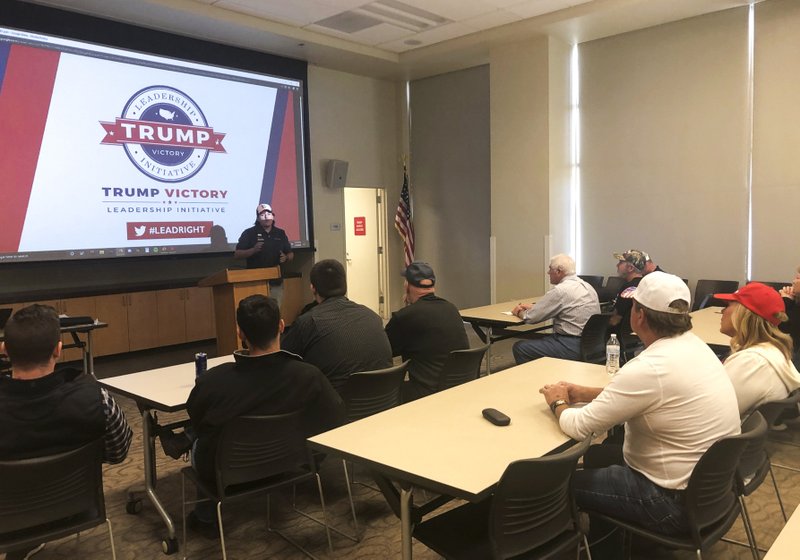Gregory Hafen II looked out at a small group of fellow Republicans and tried to hammer home just how wronged he thinks President Donald Trump has been. The impeachment investigation in Washington is a mere political attack, he argued. “It’s witch hunt after witch hunt,” he said, glancing occasionally at his notes.
Hafen, a Republican state lawmaker and the rural Nevada chairman of Trump’s reelection campaign, had gathered with a small group of volunteers in a suburban Las Vegas public library to teach them to spread the word: “That’s why we’re here today, to encourage everyone to volunteer.”
At doorsteps and protests, in phone calls and social media posts, Trump’s campaign is marshalling its army of devoted followers to defend the president against the threat of impeachment. Certain the war in Washington only fires up Trump fans, the campaign is training volunteers how to stoke that frustration and channel it against Democrats. In battlegrounds states such as Nevada, the effort — dubbed “Stop the Madness” — has quickly merged with a canvassing campaign already making regular contact with voters ahead of next year’s election.
“It didn’t seem possible to get President Trump’s supporters more fired up than they already were,” said Tim Murtaugh, the Trump campaign’s spokesman. “Democrats have done it with their sham impeachment proceedings,”
The effort reflects the Trump campaign’s confidence that the impeachment fight will not only energize his diehard supporters, but also turn off voters weary of the fighting in Washington and willing to blame Democrats for the latest battle.
Trump’s campaign isn’t just waiting for voters to bring up impeachment — it’s “owning it,” raising it on phone calls and door-knocks across the country, said Rick Gorka, a spokesman for Trump’s campaign and the Republican National Committee. The campaign and the RNC have spent more than $10 million in impeachment-related TV ads already, with more expected in the coming weeks as Democrats begin their open hearings.
The RNC says more than 75,000 new people have signed up to volunteer through its anti-impeachment website, and more than 100,000 new donors have given money to Trump since House Democrats announced the beginning of the impeachment proceedings in September.
Volunteers and staffers are regularly trained and provided with the party’s current messaging. That’s been a moving target, as Trump and the White House have shifted explanations for why he asked a foreign leader to investigate a political rival and whether it was an abuse of power.
When talking to Trump backers, canvassers have been echoing Trump’s claim that he’s a victim of another partisan attack, fueled but not by facts but by Democrats’ years-long push to oust him from office. Trump’s campaign believes this messaging is effective even for voters lukewarm on Trump, since many say they wish Washington would focus more on the issues important to them and less on investigations.
“We’re turning this into a real rallying cry for the president’s supporters,” Gorka said. He added that they’re also using it to win over some who are less supportive of the president, “but see this process for what it is, a political hit job.”
More Americans approve than disapprove of the impeachment inquiry into the president, according to late-October poll by The Associated Press and the NORC Center for Public Affairs Research. But opinions on the investigation are sharply polarized, with 68% of Democrats strongly approving of the inquiry and 67% of Republicans strongly disapproving.
Despite this support for the investigation, many Americans do consider the process to be politically motivated.
The poll found 53% of Americans think the House is acting mainly on a political motivation to challenge Trump’s presidency, while 43% think the House is acting mainly in good faith on its responsibility to investigate the executive branch. More than 8 in 10 Republicans and about a quarter of Democrats say the probe is motivated more by politics than oversight responsibility.
Democrats say the Trump campaign’s galvanizing tactic will fall short and pointed to Republican setbacks in elections this week, where Republicans, including those who highlighted the impeachment fight, lost ground in suburbs.
“Banking on a strategy to highlight credible impeachment efforts against Trump didn’t work in Kentucky or Virginia and won’t work in Nevada,” said Alana Mounce, Nevada State Democratic Party Executive Director. She said Nevada voters are focused on Republican policies on health care and taxes, and “that’s why they rejected Trump in 2016 and will do so again in 2020.”
In Nevada, a state Trump lost in 2016 but is aiming to win over next year, about 20 people gathered to watch a slideshow outlining the campaign’s counter-impeachment push, including instructing supporters to contact Democratic lawmakers, Susie Lee and Steven Horsford, to express opposition to their votes in favor of the impeachment inquiry. The campaign then taught canvassers how to go out and knock doors for the president.
Trump volunteer Thomas Sobol, who showed up at the Las Vegas training wearing a MAGA hat and a T-shirt that said, “America: Love it or Leave it,” said he’s “more motivated now than ever” to go door-to-door talking to voters about the president.
But when he knocks on someone’s door and talks about impeachment, the reactions are polarized, Sobol said.
“You get people that are frustrated with what’s going on in Washington and the impeachment push. You get other people that don’t want to talk to me and you know, they’ll close the door,” he said. “That’s not going to change.”
(AP)











